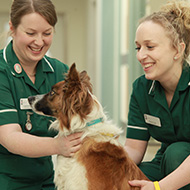
Accurate reflection of independent research sector needed to inform funding.
Organisations that carry out research into canine health and welfare are being asked to participate in a study that will inform future funding strategies.
Specialist veterinary and non-university organisations that fund specific disease research or conduct their own in-house canine research are being sought by the Royal Veterinary College (RVC) to create a clear picture of the levels and distribution of UK canine health research funding.
This project aims to develop a joint strategy to agree priorities for future research funding decisions through collaboration with funders, vets, scientists, dog breeders and owners.
Dr Alison Skipper, postdoctoral researcher at the RVC, explained: “We are really keen to hear from as many non-profit organisations involved with canine health research funding as possible. The breadth and depth of this data is vital to ensure that our findings accurately reflect this sector.
“We hope this project will eventually generate a centrally agreed strategy for funding non-commercial canine health research and lead to focused future collaborative research development, with the potential for shared understanding and prioritisation for the sector.
“The goal is to ensure that the most pressing canine health issues are addressed more effectively through co-ordinated research efforts.”
Relevant organisations will be asked to submit a brief description of each research project they received funding for, and where possible, how much funding each project received. This data will be confidential and anonymised prior to publication.
Carried out through the RVC's VetCompass programme, the study is fully funded by Battersea, Dogs Trust, The Kennel Club Charitable Trust and The Waltham Foundation.
Further information about the study, including how to get involved, can be found on the VetCompass section of the RVC website.
Image (C) Royal Veterinary College



 The RCVS has announced a new version of its 1CPD mobile app, with enhanced features for veterinary surgeons and veterinary nurses to record their continuing professional development.
The RCVS has announced a new version of its 1CPD mobile app, with enhanced features for veterinary surgeons and veterinary nurses to record their continuing professional development.